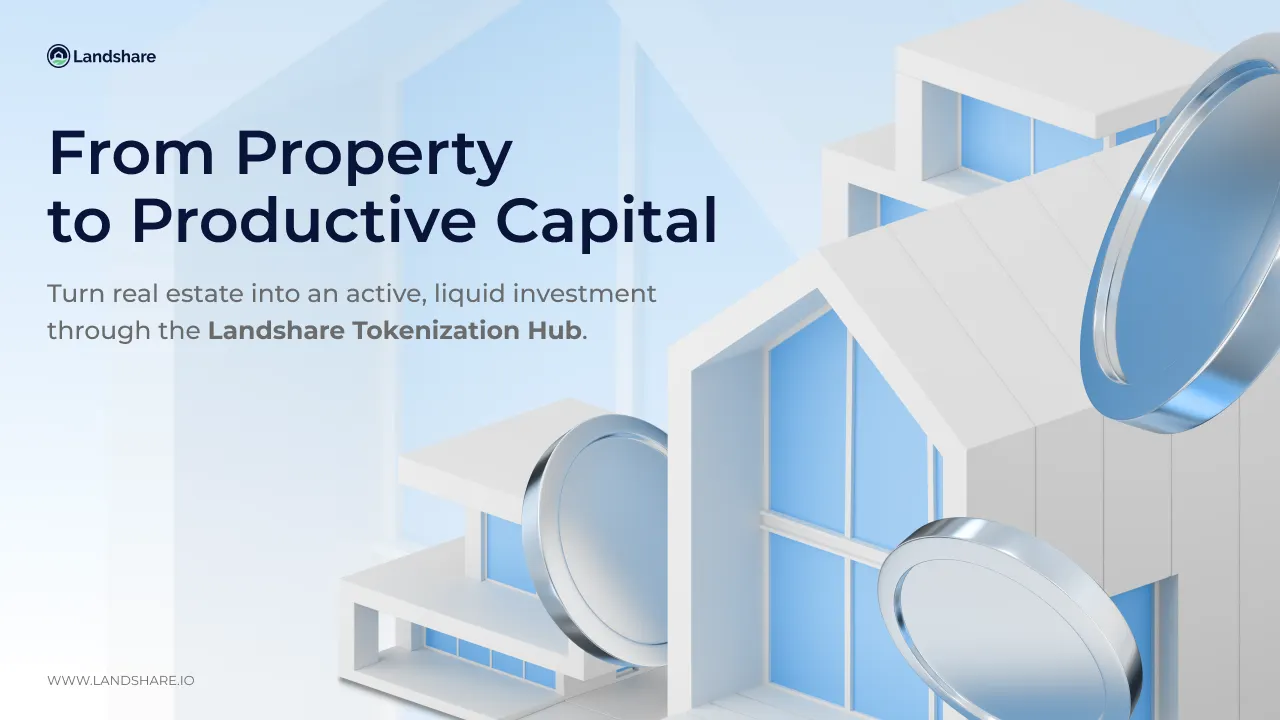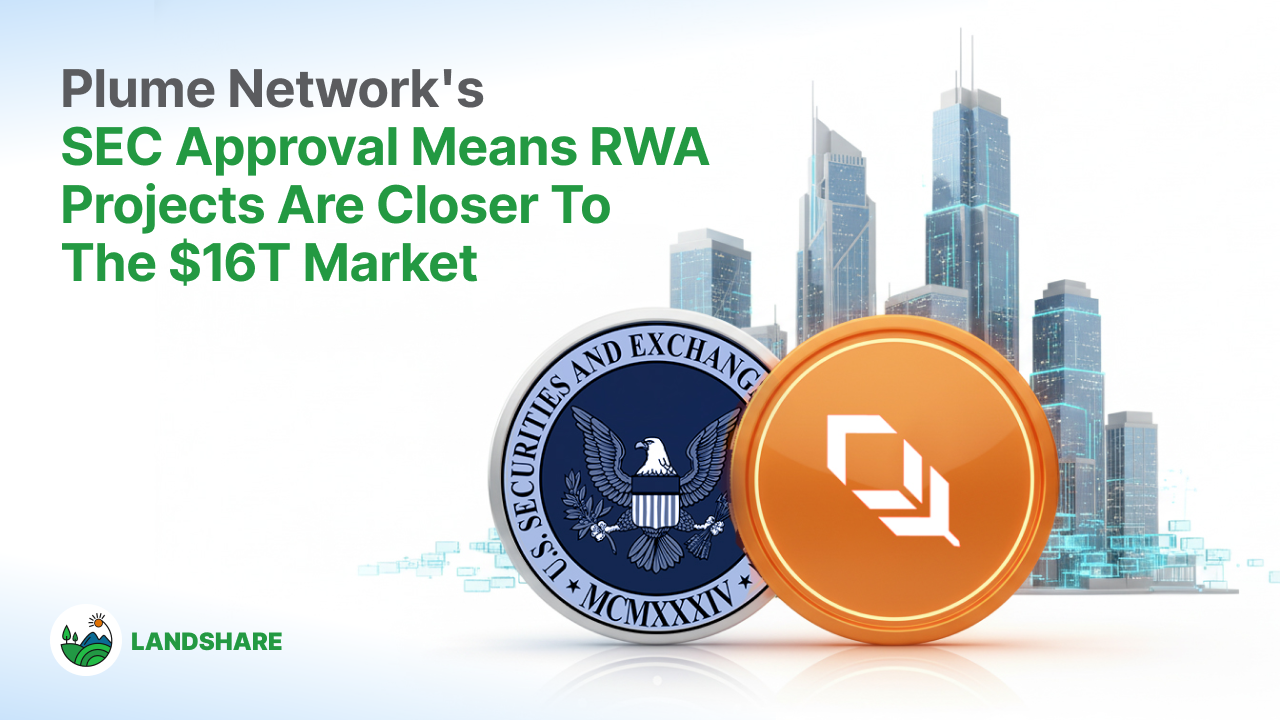Why Real Estate-Backed Tokens Offer the Best Safe Haven for Crypto Traders
Landshare Team

It’s no secret that the cryptocurrency market is highly volatile. While its potential upside is unmatched, it also frequently experiences sharp price corrections and enters prolonged bear markets. When this happens, investors need a place to protect their funds from losses — often referred to as safe havens.
A safe haven is a type of investment that is expected to retain or increase in value during times of market turbulence. Investors move funds into safe havens to mitigate their risk of losses during market downturns. In the crypto space, these types of investments can be difficult to find — especially if the investor is also expecting a consistent return.
Real estate-backed tokens offer the ability to invest in real estate directly on-chain. They are not affected by cryptocurrency bear markets because their value is derived from real world assets. By moving trading profits and idle funds into real estate-backed tokens, investors can protect their funds from volatility while also earning regular cash flows.
What are real estate-backed tokens?
Real estate-backed tokens, or Asset Tokens, are cryptocurrencies that represent the ownership of real-world assets. To put it simply, the value of an Asset Token is based directly on the value of the asset it represents. All of this is made possible by a process called Tokenization.

Tokenization splits the ownership of a real estate asset into smaller parts represented by tokens. Each individual holder of the tokens is a co-owner of the asset and receives a share of the profits it generates. Asset Tokens tokens can be bought, sold, or traded just like any other token on the blockchain.
For a more detailed description of Asset Tokens and the process of Tokenization, check out Landshare’s Tokenized Asset Overview video.
Real Estate Tokens vs. Stablecoins
Traditionally, crypto traders move their funds to stablecoins such as USDT, BUSD, and USDC to take profits or protect themselves from market downturns. Because the value of a stablecoin is always at or near $1 USD, they allow traders to keep their funds on-chain while protecting themselves from volatility and price fluctuations. While stablecoins offer great utility in this regard, real estate-backed tokens offer several unique advantages as a safe haven for crypto traders.
1:1 Backing
Tether’s USDT is the most popular stablecoin in the market today. There is a widespread assumption that Tether holds enough USD to back up the whopping 69,000,000,000+ circulating supply of USDT. However, at this point it is not clear how many USDT tokens are backed by actual USD. According to a recent Bloomberg article:
“Exactly how Tether is backed, or if it’s truly backed at all, has always been a mystery. For years a persistent group of critics has argued that, despite the company’s assurances, Tether Holdings doesn’t have enough assets to maintain the 1-to-1 exchange rate, meaning its coin is essentially a fraud.”
On October 15, 2021, the CFTC ordered Tether to pay a $41 million dollar fine for issuing unbacked USDT tokens. According to the release:
“The Tether order finds that since its launch in 2014, Tether has represented that the tether token is a stablecoin with its value pegged to fiat currency and 100% backed by corresponding fiat assets, including U.S. dollars and euros. However, the Tether order finds that from at least June 1, 2016 to February 25, 2019, Tether misrepresented to customers and the market that Tether maintained sufficient U.S. dollar reserves to back every USDT in circulation with the “equivalent amount of corresponding fiat currency” held by Tether and “safely deposited” in Tether’s bank accounts. In fact Tether reserves were not “fully-backed” the majority of the time.”
The concerns over Tether’s operations should be taken seriously if cryptocurrency is to be adopted by the mainstream public. Without being collateralized 1:1 USD, a “run-on-the-bank” situation, or even regulatory actions, could leave hundreds of millions of users with valueless USDT that can no longer be redeemed for $1 USD.
By contrast, Asset Tokens are fixed supply tokens transparently backed by real world assets. Because token holders are shareholders of the asset itself, they have a direct legal claim to their share of the asset’s value.
Cash returns and appreciation
While stablecoins offer protections against market downturns, they do not intrinsically offer any yields or returns to investors, nor can they appreciate in value. In fact, due to inflation rates reaching 30-year highs, holding stablecoins can mean a loss of buying power over time.

Asset Tokens offer similar protections from the volatility of cryptocurrency while also offering annual cash yields and value appreciation averaging between 6–8% and 5–10% respectively, for total annual returns up to 18%. While the value of the US dollar shrinks, US home prices are projected to increase by 13.6% over the next year.
Security
Traders may choose to stake stablecoins on loan or yield farming platforms such as Venus or Beefy Finance. These platforms offer a great way to earn some extra income while holding USD and greatly outperform the rates offered by banks.
Unfortunately, these platforms come with their own risks that can still result in traders losing their investment. Due to the open nature of DeFi, many protocols have vulnerabilities that can be exploited by hackers, and these attacks are not uncommon. $119 million was recently stolen from BadgerDAO by hackers, Cream Finance was exploited for over $100 million, and Poly Network was exploited for $600 million. According to Cipher Trace, over $10 Billion was stolen in DeFi related theft this year.
In addition to DeFi risks, investors are vulnerable to the loss or theft of wallet private keys and exchange hacks, meaning funds can be lost even by holding. If these events occur, there is typically no way to retrieve lost funds.
Tokenized Real Estate offers additional security measures that traditional protocols cannot. While traditional tokens can be lost due to DeFi exploits or wallet hacks, Asset Tokens are immune to this because they are owned by the investor, not a wallet. If an investor’s wallet suffers an attack or is compromised, the stolen tokens can be administratively reissued to a secured wallet.
Conclusion
Tokenized Assets offer a great way to hold your profits in a secure and traditionally stable manner without the risks of being run on, being hacked, or sitting on depreciating assets. While your first thought for a safe haven may be holding stablecoins, it may be time to consider real estate-backed tokens as an alternative.
Landshare offers fractional real estate investment on the blockchain, enabling hassle-free investment for as little as $50. You can find out more about the Landshare platform at https://landshare.io and view our current offering at https://app.landshare.io/property-details.
New to Landshare? Learn more about the platform at docs.landshare.io.
Find us on:
Landshare October Recap
Landshare Team
October was a milestone month for Landshare – one that set the stage for the next era of on-chain real estate. From the official Landshare v2 announcement to new ecosystem updates, governance decisions, and exciting community initiatives, we’ve laid the groundwork for a future defined by growth, utility, and innovation.
This month, we introduced the framework that will redefine how investors, property owners, and DeFi users interact with real estate on-chain. Let’s recap the highlights 👇
Landshare v2 Announcement
The official unveiling of Landshare v2 signaled the start of a new chapter – one built around real utility, real yield, and real scalability.
Landshare v2 isn’t just an upgrade. It’s the foundation of a self-sustaining ecosystem where tokenized real estate finally reaches its full potential. The new system transforms stable assets into active yield-generating opportunities, seamlessly connecting traditional markets to DeFi.
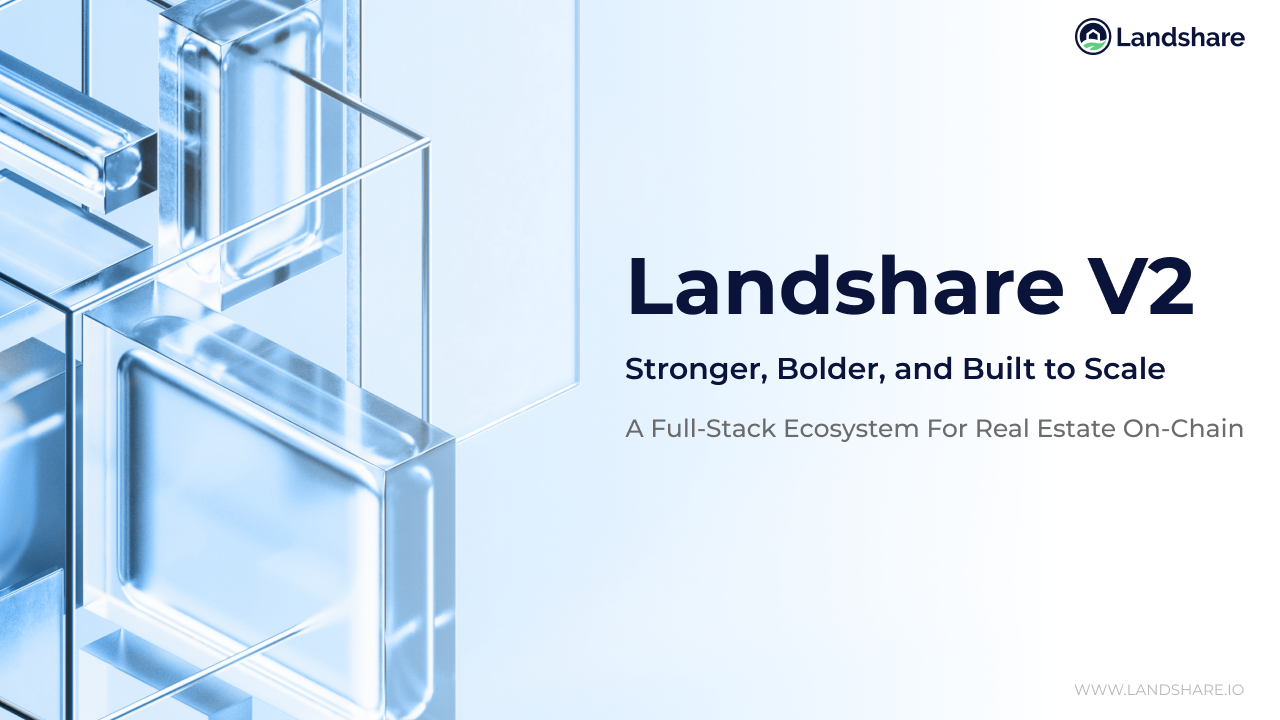
The Three Pillars of Landshare v2
In our follow-up deep dive, we explored the three core pillars that form the foundation of Landshare v2:
- The Real Asset Vault (RAV): A seamless gateway for stablecoin holders to earn real yield backed by tokenized properties.
- The Tokenization Hub: A complete solution for property owners to bring their assets on-chain.
- The DeFi Suite: Tools and incentives that amplify participation and utility across the ecosystem.
Together, these pillars create a self-sustaining growth loop, where every user and property strengthens the entire network.
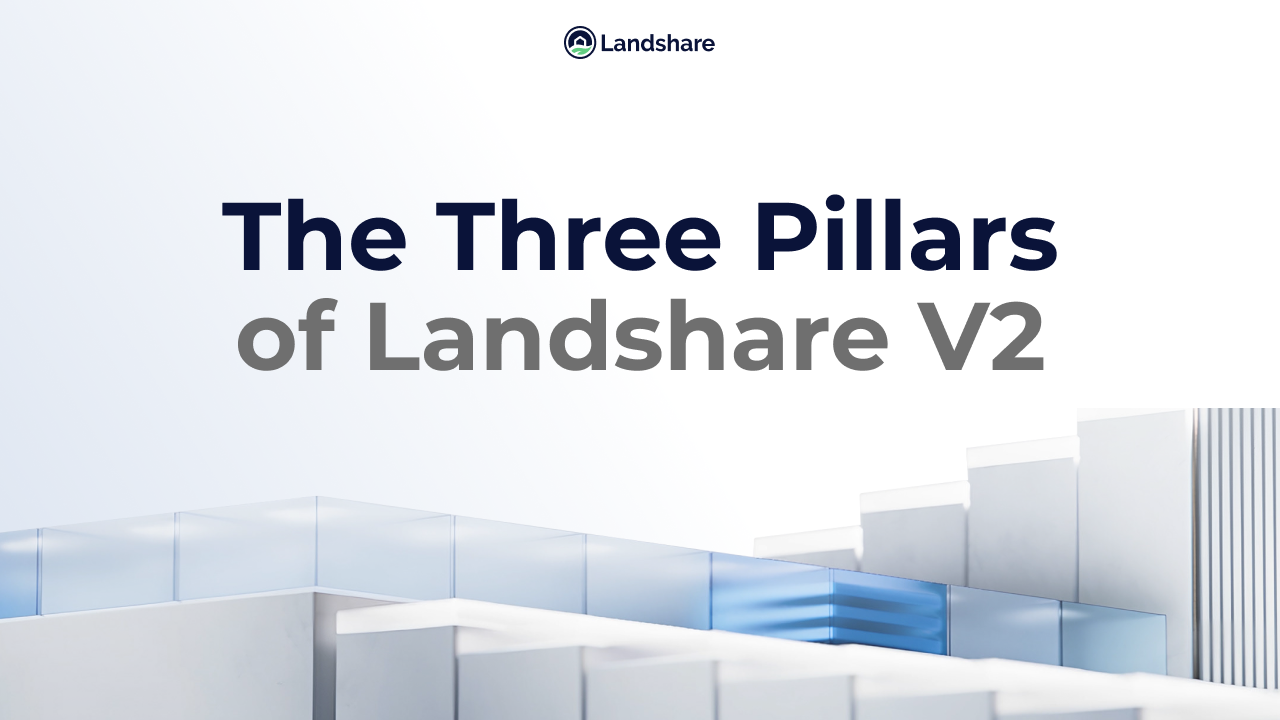
DAO Proposal Passed
In late October, the community voted to reduce LP emissions by 50% across both the LAND–BNB and LSRWA–USDT pools – with the proposal passing at 62.28% in favor.
This important step helps:
✅ Reduce daily LAND inflation
✅ Strengthen token scarcity and price stability
✅ Extend the reward pool lifespan
✅ Encourage long-term liquidity participation
The change will take effect within 48 hours of approval and marks another move toward a more balanced, sustainable economy for Landshare v2.
🗳️ View the full proposal and results
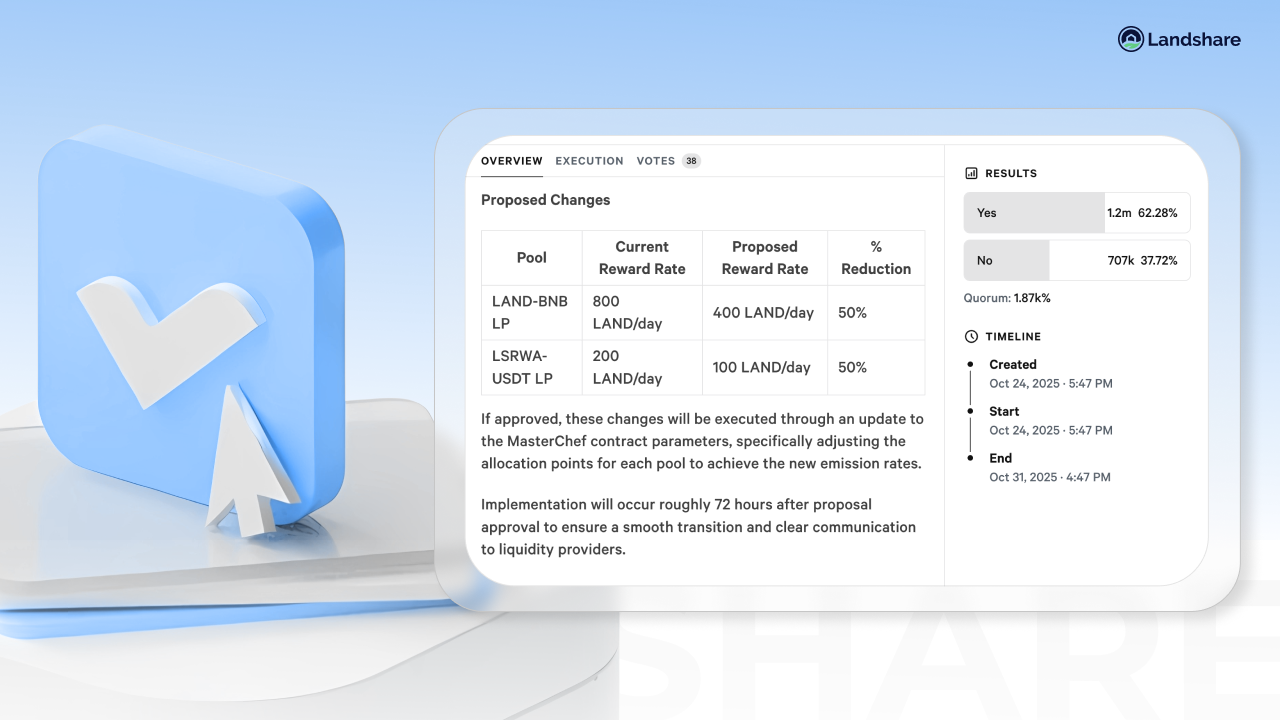
Tokenization Hub Breakdown
We released a comprehensive guide to the Landshare Tokenization Hub, explaining how property owners can now go beyond simple tokenization to access real investors, liquidity, and on-chain utility.
The Hub bridges traditional real estate with blockchain finance – creating a pathway for real-world assets to generate ongoing yield, transparency, and accessibility.

4.5M+ LAND Staked
October also marked another key milestone – over 4.5 million LAND tokens (nearly half of the total supply) are now staked in vaults. This incredible community achievement reflects growing confidence in Landshare’s long-term vision and token utility.
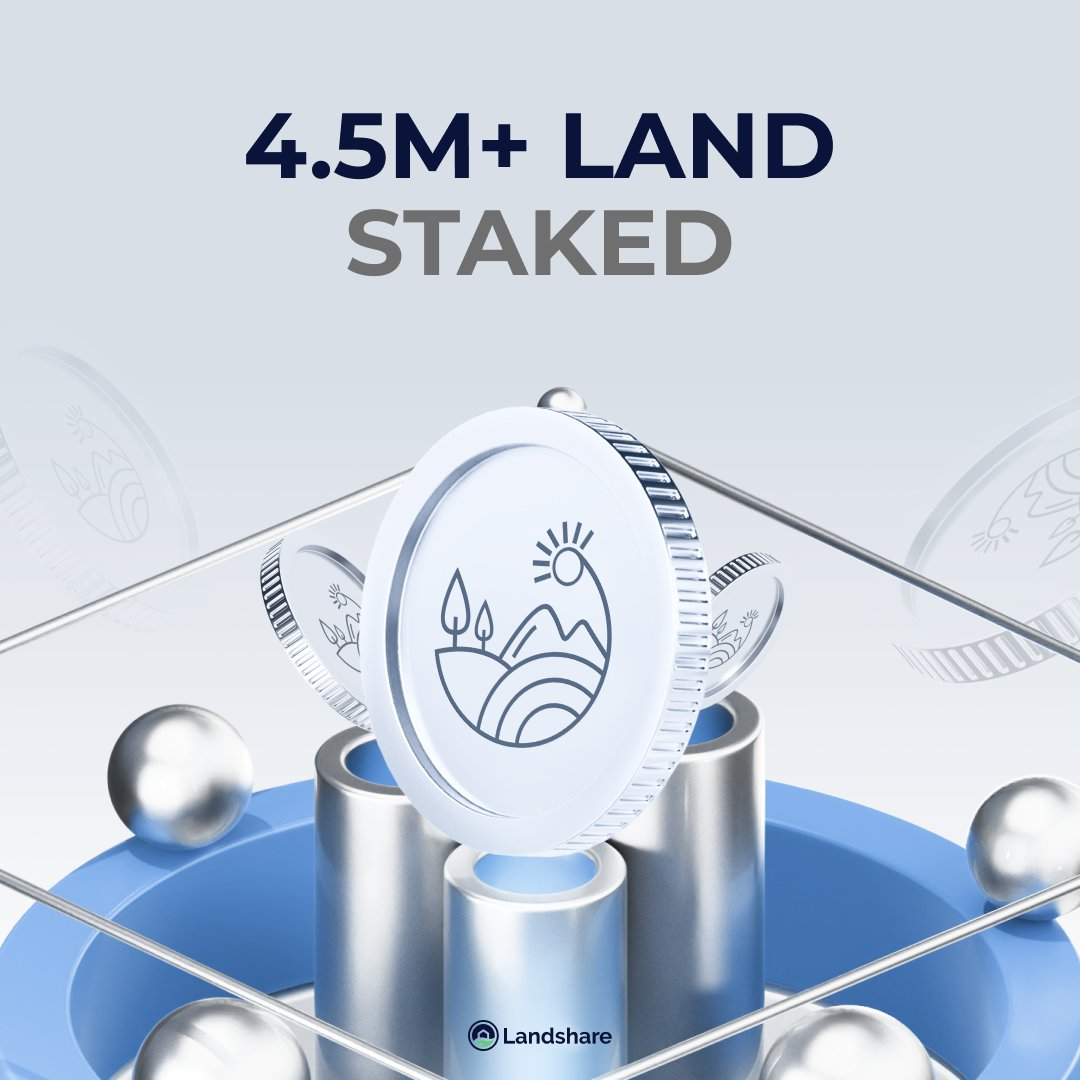
Community Townhall Incoming
We’re excited to announce our next Community Townhall, happening Thursday, November 6 at 12 PM CST or 6 PM CET on X Spaces!
Join Jordan (CEO), Travis (Co-Founder), and Ivan (CMO) as they discuss everything happening with Landshare v2, recent DAO proposals, and take your questions live.
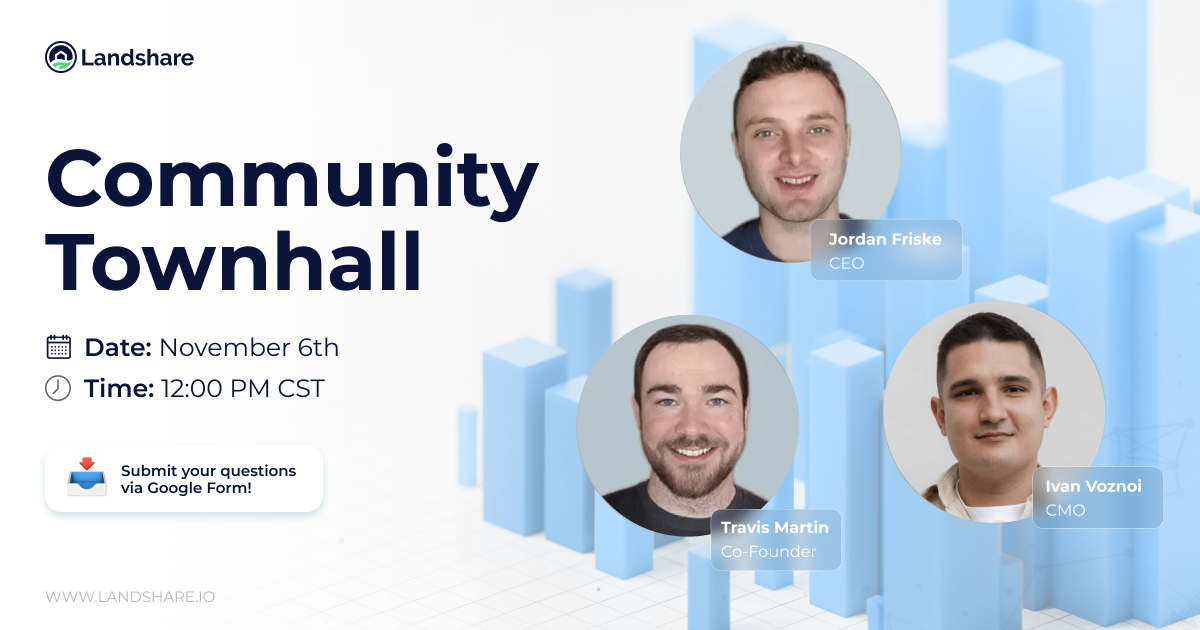
Looking Ahead
With Landshare v2 on the horizon, the foundation is set for a new phase of growth and adoption. In the coming weeks, we’ll be sharing more details on the RAV launch, the Points Campaign, and other major milestones driving our ecosystem forward.
Stay tuned – the future of real estate is being built on-chain, and we’re just getting started.
Tokenization Hub Breakdown
Landshare Team
Real estate tokenization has been a buzzword for years. Yet in practice, most projects have failed to move beyond press releases and empty promises. Too often, blockchain has been used as a veneer to package illiquid or low-quality assets, leaving investors with tokens that serve little purpose and property owners with no meaningful results.
Without investors, liquidity, or secondary markets, tokenization becomes little more than an on-chain spreadsheet — a digital record of ownership that no one can trade or invest in. For property owners, that means time and money spent “tokenizing” without achieving key goals: raising capital, expanding visibility, or unlocking value.
A Smarter Path Forward
For real estate tokenization to truly work, it needs to deliver tangible investment outcomes. After years of building and refining on-chain real estate products, Landshare has developed a model designed to do exactly that.
The Landshare Tokenization Hub transforms tokenization from a passive concept into an active investment process — connecting high-quality properties with real investors, liquidity pathways, and a live blockchain economy.
The Tokenization Hub Solution
Most platforms stop once a token is created. Landshare’s Tokenization Hub goes further , offering a complete pathway for property owners to bring their assets on-chain and immediately engage investors.
Each project is structured for success from day one, with:
- Customized tokenization models tailored to each property
- Transparent fundraising mechanics with defined soft and hard caps
- Built-in integration with the broader Landshare ecosystem
By connecting directly to Landshare’s existing network of investors and DeFi infrastructure, offerings can attract participation as soon as they launch. Once a fundraising goal is met, property tokens are deposited into the Landshare RWA Pool, linking them to ongoing liquidity, yield mechanisms, and secondary market exposure.
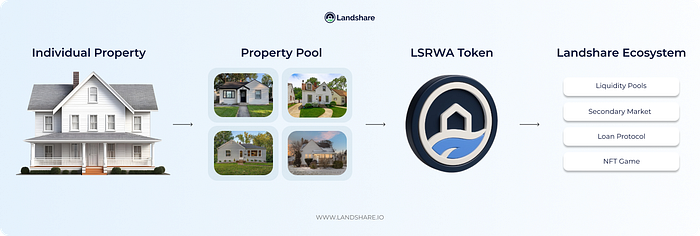
Why This Model Delivers Real Results
Where others leave property owners to manage marketing, compliance, and liquidity alone, the Tokenization Hub handles these as part of a unified process. This integration dramatically increases the likelihood of meeting fundraising goals and sustaining long-term engagement.
Integration with the Landshare RWA Token (LSRWA) is central to this model. Rather than isolated tokens with no market, each property becomes part of a shared, liquid environment that generates yield and investor participation. Individual assets can still be represented, extracted, or traded independently when needed.
For example, a multifamily property owner might tokenize 20% equity to raise $500,000 on-chain, connect the asset to the RWA Pool for ongoing yield, and maintain full transparency for investors — all within a compliant, accessible framework.
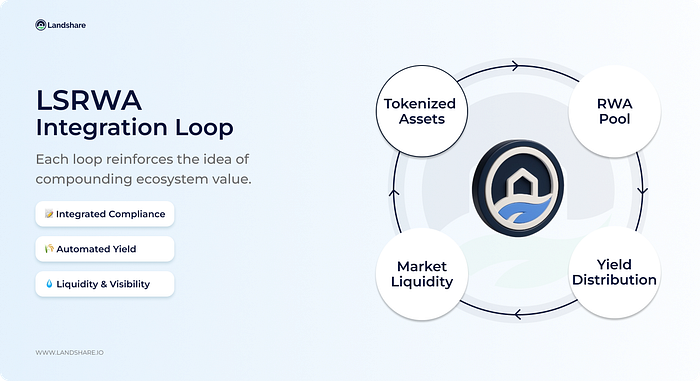
How It Works
- Tokenize the Property: Landshare collaborates with property owners to create a digital representation of equity, income rights, or hybrid participation.
- Launch the Offering: The property is listed on the Tokenization Hub with defined terms, caps, and transparent investor access.
- Fundraising & Validation: Investors participate directly on-chain. Once the soft cap is reached, funds are secured and the offering is finalized.
- Ecosystem Integration: Tokens are deposited into the Landshare RWA Pool, and investors receive LSRWA tokens representing pooled value and yield potential.
- Ongoing Value Creation: Property owners gain lasting benefits through liquidity, visibility, and investor engagement. As new assets are added to the pool, owners can rebalance between equity and cash, making real estate a more dynamic and liquid asset than ever before.

Built for Real-World Impact
The Landshare Tokenization Hub is more than a technical service — it’s a complete ecosystem designed to make real estate investment active, liquid, and accessible.
For property owners, it offers a streamlined way to raise capital and connect with global investors.
For investors, it provides exposure to yield-generating, on-chain assets backed by transparent real-world value.
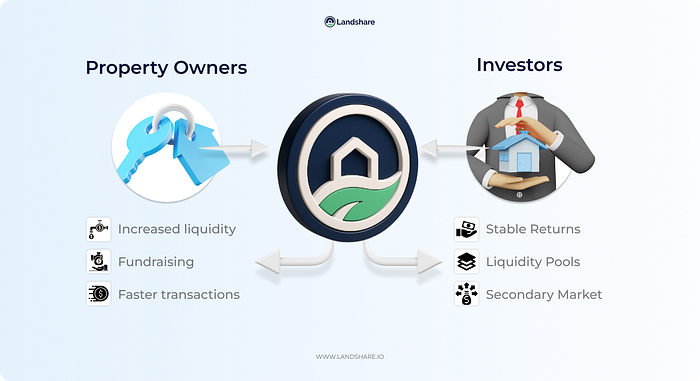
In an industry crowded with static tokens and overhyped promises, the Tokenization Hub delivers what tokenization was always meant to achieve — real outcomes, real liquidity, and real-world results.
🏡 About Landshare
Landshare is a tokenized real estate ecosystem that enables seamless investment in real-world assets on the blockchain. With Landshare, you can own a share of a real-world property simply by holding our RWA Tokens ($LSRWA). Our platform offers a secure, transparent, and efficient way to invest in real estate without traditional barriers.
- Website: landshare.io
- Twitter: @Landshareio
- Community: t.me/landshare
Plume Network's SEC Approval Means RWA Projects Are Closer to the $16T Market
Landshare Team
On October 6, Plume Network announced on its social media that it had been approved to be an SEC-registered transfer agent. This is a big milestone for the RWA industry, signaling that the traditional financial system is welcoming tokenized assets.
Transfer agents basically manage important back-end work and are the official record-keepers for securities issuers. So, essentially, they maintain shareholder registries, record ownership changes, issue certificates, and handle other corporate actions.
Plume’s approval means these critical functions can now be managed on-chain for tokenized securities. This is a pretty big deal, as it gives Plume and its users formal regulatory standing under U.S. law for on-chain securities.
Experts believe that this approval can boost the global RWA market, and top players like Landshare can benefit from it due to the increased regulatory clarity.
Why is the SEC’s Approval Important for Plume Network?
So, first, understand the roles of a registered transfer agent to get a better understanding of its importance.
In traditional finance, a transfer agent is usually a company or bank that tracks who owns a company’s securities and facilitates trades. They ensure every share transfer, stock split, or dividend payment is accurately recorded and reported. Now, let’s understand how this traditional role will work in the world of blockchain.
Post Link
By replicating these roles on-chain, Plume’s platform can securely log every token sale or dividend distribution in an immutable ledger, while also syncing with regulators. As Plume explains, its transfer-agent protocol will “link cap tables and reporting directly to SEC and DTCC systems”.
This means tokenized equity and debt on Plume can behave like traditional securities, but will be managed better with the help of blockchain technology.
Plume’s CEO believes that this regulation “exists to protect investors’ rights as shareholders,” and Plume’s on-chain solution is meant to simplify the processes under that framework.
Its Impact:
Experts believe that the registration will open up several doors for the RWA market because of the ‘trust factor’. Being registered means there are no risks as far as legality is concerned. When an industry or its top player receives a green flag from the government regulatory agencies, institutional capital follows.
BlackRock, Fidelity, JP Morgan, etc., are already looking to build blockchain-based products. This will further invite them to join the RWA growth story and possibly super-boost it.
Moreover, another important benefit is that tokenized securities can now flow through compliance obstacles. This means issuance times can be cut from months to weeks with the help of smart contracts. Similarly, on-chain dividends and ICOs can enjoy the same legal protections as Wall Street offerings.
What Does This Mean For The RWA Market?
Plume’s win comes at a time when analysts are already forecasting a massive growth in tokenized RWAs over the next decade. Institutions now value tokenization as a way to digitize everything from private credit to real estate. Also, the numbers are pretty optimistic as well.
A Boston Consulting Group report estimated the global asset-tokenization market could reach about $16.1 trillion by 2030. The industry has already grown by almost 380% in the past three years. To put things into perspective, today’s entire crypto market cap is smaller than those figures. Even some of the more conservative forecasts still show multi-trillion growth.
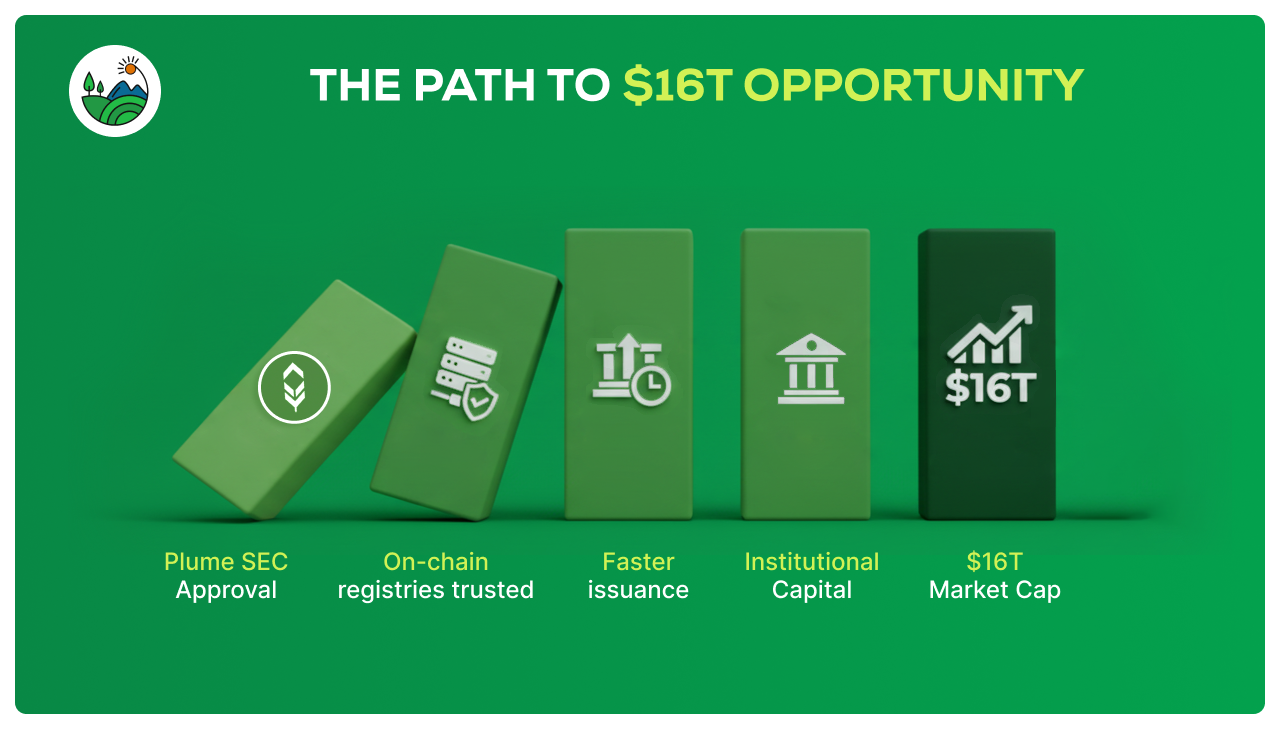
If these estimates can materialize in the days to come, RWA is well-positioned to be one of the largest markets in the world of modern finance.
Moreover, the external conditions are favoring this industry. Governments and regulators worldwide are creating proper frameworks. For instance, Asia-Pacific markets are running pilots for digital bonds and crafting standardized rules for security tokens.
These developments and the excitement of retail investors in this category build confidence that the $16T opportunity is actually very real.
How Will Landshare Benefit From This?
Landshare stands at the forefront of benefiting from this opportunity because of its early entry and real-world utility. This is very important as institutions seek new projects that have use cases that can help them capture a considerable market share.
Moreover, Landshare already operates as a compliant RWA platform. For instance, each Landshare RWA Token (LSRWA) is a security token representing fractional shares of a U.S. real estate portfolio, and buyers must pass KYC/AML checks.
The fact that regulators are now approving on-chain transfer agents shows the industry’s efforts are finally paying off. Here are some more factors that can help Landshare be one of the top RWA contenders:
1. Regulatory Credibility: Plume’s SEC status essentially means that tokenized securities can operate within established rules. Landshare’s approach aligns with these principles. So, investors can be assured that their projects sit within a legal framework designed to protect shareholders.
2. Investor Confidence: Every step toward clear regulation lifts confidence. The recently passed GENIUS Act, the SEC’s staff statements on liquid-staking, and the Trump administration’s overall outlook towards the crypto market have been fairly positive.
Similarly, Plume being approved as a SEC-registered blockchain transfer agent tells retail and institutional investors that projects like Landshare aren’t mere experiments. They’re rather a part of a regulated financial evolution.
Moreover, it means regulators see value in on-chain tokens, and that kind of signal helps legitimize the space Landshare operates in.
3. Landshare’s Own Progress: Landshare isn’t about hype. It is rather focused on delivering value from day one. The project has already sold four houses on the BNB chain. It is also providing consistent rental returns to the investors in its properties.
Moreover, the team remains focused on delivering stable, compliant returns from real estate growth.
Conclusion
So, now we know that the recent news was about more than just Plume Network being approved by the SEC to be a transfer agent. It rather has a much bigger impact on the RWA market as a whole.
While the industry continues to grow, for Landshare, it is the right time to innovate further and add more value to consumers’ lives.






